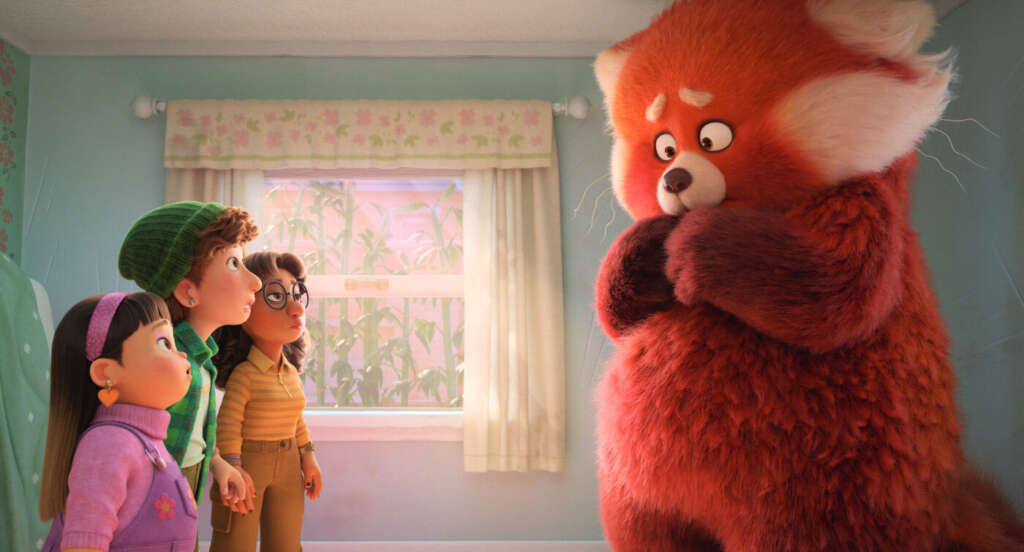Share This Article
Pixar has released a delightful new animated film where Mei, a 13 year-old Chinese-Canadian girl who lives in Toronto with her parents, turns into a red panda whenever she is feeling strong emotions. In a PG film which features stunning animation and powerful messages about the difficulty of growing up and the strength of female friendship, parents have turned to Twitter to express their outrage that Turning Red mentions periods. Sigh.
Why are periods still seen as a controversial subject, or not appropriate for children? I got my period when I was 11, an age where I was very much still a child. Luckily, my mum had made sure I was informed about what might happen – it wasn’t such a shock when, on a summer’s day and wearing white shorts of course, my period started.

What I do remember was the deep embarrassment I felt, hiding in the back aisles of Boots while my mum loudly asked the pharmacist whether ibuprofen or paracetamol would be better to ease my cramping. This embarrassment is something I’ve rarely seen in a film, let alone in a PG. I found the embarrassment Mei’s mother caused when shouting to her about forgetting her pads in front of her classmates powerful. It was refreshing to see this depicted on screen.
Some parents have complained that watching this with their sons forced them to have difficult and uncomfortable conversations. As someone who has suffered from period pain which goes far beyond the threshold of discomfort (I now manage it with prescription medication), it seems like the least men and boys can go through is an uncomfortable conversation. Surely it’s our responsibility as a society to educate boys about periods, to have the conversation. Maybe that way periods will cease to be something so controversial.
The other aspect of the film which has been accused of being “inappropriate” is when a group of 13-year-old girls have crushes on boys (a boy band and a 17 year old who works in the local supermarket), and they rebel against their parents by trying to buy concert tickets. The double standard existing between the problematic ‘boys will be boys’ narrative (where boys sharing their sexual desires is seen as healthy) vs the sexuality expressed by the girls in this film is damaging. Children going through puberty experience a lot of changes, and for most this means experiencing sexual attraction. There is nothing wrong with this being expressed on screen, although it would have been nice to see one of the girls express an interest in another girl rather than them all crushing on the same boy. But I suppose that might have been too much for Pixar to handle in one film.

Turning Red is the first feature film from director Domee Shi, and also the first Asian-led film from Pixar. It has disappointingly garnered criticism from Twitter users, who claimed they could not relate to Mei because of her Chinese-Canadian ethnicity. These are presumably the same parents who would happily watch, relate and root for Remi the rat as he pursued his career as a chef in the Pixar hit Ratatouille.
For me, the best part of ‘Turning Red’ was the spotlight it shone on the complexity of female emotion. Mei and her mother Ming both have the red panda gene, which is passed through every woman in their family. We see how they both have been impacted with generational trauma, but also how difficult it is to control their emotions, lest the red panda make its appearance.

I watched this film immediately after having a filling at the dentist, when I was feeling particularly wobbly, and was struck by how much women are required to keep their emotions in check. I wouldn’t let myself cry in front of the dentist despite feeling horribly anxious, just as I would not want to get emotional in front of a boss at work for fear of being perceived weak or unstable.
Mei openly struggling with her emotions and choosing, with the help of the love and support of her friends and family, to stay in touch with her emotions and keep her panda, is a message I would have found really useful as a teenager, and still find useful now. And who wouldn’t want their children to learn that?
Turning Red is streaming now on Disney+.
Enjoyed this article? Read more here: In defence of Scotland’s ‘sex survey’


